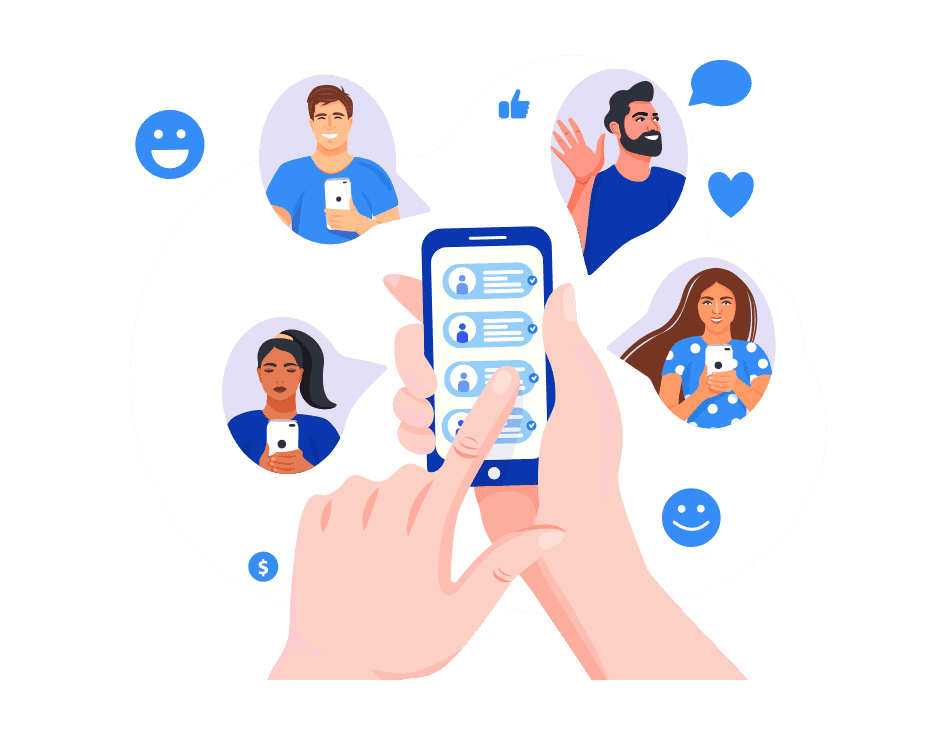Medical Marketing Using Empathy, Compassion, and Humor
It starts with inclusive, ethical and respectful marketing.
Effective medical marketing will often make an emotional connection with people. Empathy is powerful emotion and builds a connection with your audience. Emotional and inclusive medical marketing harnesses the nuanced emotional landscape of potential patients to foster deeper connections and encourage them to seek treatment. This strategy leverages the innate emotional responses associated with healthcare to engage patients more profoundly and persuasively.

Standard, boilerplate marketing materials will soon be forgotten as soon as someone’s attention is directed elsewhere. However, your medical practice will stand out among your competitors if you can make an emotional connection with someone. You have undoubtedly come across these advertisements:
• A story about how a business going is the extra mile helping someone show has suffered a recent loss or atmosphere, like a death in the family or a house fire.
• A commercial promoting a business sponsoring a blood drive helping to restock critically low blood supply in a major metropolitan area.
• It is a Super Bowl commercial that is so funny that you are looking for the video on YouTube to post online on your social media channels.
All three of these things may make you remember an emotional connection with other people in three different ways:
• Empathy
• Compassion
• Humor
You will make your campaign much more effective if you can craft medical marketing effort that connect with people in one of these three emotions.
1. Empathy
Empathy occurs when people begin to understand and share the feelings of another person. Using empathy to help marketing your medical practice can be useful in promoting your services to the community around you. To use empathy in medical marketing, a clinic should focus on things that other people have experienced. Marketing campaigns that tell the story of someone suffering from an ailment can be effective in triggering potential patients in remembering when they or a family member were in a similar situation. They would associate that experience with the marketing campaign they are seeing and imagine how things would have been different if they had received treatment from your clinic. Some example of empathetic marketing campaigns include:
• Showing a parent helping a child get treatment when they are sick with the flu
• Telling the story of someone who is unhappy with their current health situation, but is unsure how to rectify it
• Showing the rehabilitation of someone who has suffered a significant injury
2. Compassion
Compassion, although sometimes confused for empathy, is distinctly different. Compassion in someone is noted by sympathetic pity or concerns for others who have suffered a misfortune in life of some sort. While that person may not have personally experienced something similar in their own lives, they may be moved emotionally in some way. Compassion often leads to people wanting to help in some way or willing to offer services to others. Compassion can be used in medical marketing when a clinic is asking for support in some way from the public. Generally, compassion is used when a medical practice needs assistance from the community to achieve some goal. Some examples of compassion in medical marketing include:
• A fundraising appeal to help keep a program aimed to provide free medical care to low-income families active
• Asking the community to participate in an annual event, like a marathon, to raise money to help research a cure for an illness or condition
• Asking the community for volunteers to help a clinic triage injured patients after a major disaster
3. Humor
Humor, to put it simply, is bringing amusement to people’s lives. When someone is affected by humor, they are generally laughing, smiling, or smirking. Of the three emotions mentioned here to connect with potential patients, humor can be the most “fun.” With that said, humor can be dangerous if you are not mindful of how you are using it. You do not want to be tasteless, hurt others’ feelings, or make fun of someone else’s suffering. If you do, you may incur a lot of bad publicity that will hurt your business. Humor, while fun, needs to be used carefully. Some examples of humorous marketing campaigns:
• Someone suffering an injury, like a sprain, and trying to get through the day failing at everything until a little child tells them that they need medical treatment
• A patient going to a “crazy doctor” who can not help them before finding a “good doctor” who knows how to treat them for their ailment
• Someone suffering from a fake ailment, like heartbreak over a losing sports season, trying to get treatment for it but instead is informed about all of the other treatments available
Always check with others about a medical marketing campaign using empathy, compassion, or humor before launching it.
Undoubtedly, you have seen stories about businesses in many different industries who get in trouble for having a terrible advertising campaign that upsets a significant number of people. You do not want a news story about how everyone is mad at you about your medical clinic’s advertisement. You may have said aloud, “Why didn’t anyone stop that marketing campaign or thought it wouldn’t make people upset when hearing that story?” The problem is that people who work together long often enough begin to think the same. Just because everyone in the office may think it is funny, does not mean the rest of the community will have the same impression. It is always best to check with a third party outside of the office to make sure your medical marketing efforts strike the right emotional tone. You need to check in with others outside of your medical clinic if you are trying to be “edgy” or “make people think.” These types of marketing campaigns that use emotion to connect with patients are often more likely to cause bad publicity.
Which is more effective? Empathy, Compassion, or Humor?
The emotion you want to select often depends on your medical clinic’s nature, and the goals you want to achieve. Your clinic may be able to use all three in different marketing campaigns and be somewhat effective. On the other side, maybe only one emotion produces the results you had set for it. You will have to experiment to see which emotion converts the most patients for your clinic. Generally, humor is the easiest, followed by empathy, then compassion. With that said, this is very dependent on your medical clinic and the activities you conduct there.
Understanding Patient Emotions:
- Deep Emotional Insight: Conduct thorough research to grasp the prevalent emotions such as anxiety, hope, or relief that patients typically experience concerning your healthcare services.
- Empathetic Engagement: Show genuine understanding and empathy in your communications, demonstrating how your services can positively transform their health outcomes.
Crafting Impactful Emotional Messages:
- Benefits-Oriented Messaging: Move beyond listing services to articulate how your healthcare solutions enhance life quality, reduce stress, or restore health, using narratives and testimonials that underscore the emotional benefits.
- Motivation and Hope: Emphasize optimistic outcomes and the potential for health improvement, motivating patients to take actionable steps toward wellness.
Utilizing Emotional Visuals:
- Powerful Imagery: Employ images and videos that stir positive emotions, showcasing patients who have achieved significant health milestones.
- Real and Relatable Photos: Use genuine photos from your practice, avoiding stock imagery to ensure authenticity and a stronger emotional connection with your audience.
Personalizing Your Approach:
- Audience Segmentation: Adapt your messages to resonate with specific demographic groups, whether they are young families, busy professionals, or seniors, addressing their unique emotional triggers and healthcare needs.
- Consistent Multi-Channel Integration: Implement these emotional strategies across all platforms, from digital to print, ensuring a unified and coherent message that resonates across all touchpoints.
Emotional Techniques in Practice:
- Balanced Fear Appeals: Carefully use fear appeals to underscore the importance of proactive health management without causing alarm, focusing on empowering patients through preventive measures.
- Stories of Hope and Recovery: Highlight patient stories and testimonials that speak to successful treatments and recovery, inspiring confidence and action among prospective patients.
- Judicious Use of Humor: Where appropriate, incorporate light humor to make your messages more engaging and approachable, ensuring it’s always respectful and considerate.
Ethical and Respectful Marketing:
- Genuine Empathy: Prioritize authentic empathy over manipulation, focusing on nurturing trust and credibility with potential patients.
- Transparent Claims: Maintain honesty and transparency in your claims, anchoring them in verifiable facts and avoiding exaggerations that could mislead patients.
- Privacy and Consent: Handle personal patient stories with the utmost respect and confidentiality, securing explicit consent before sharing any details publicly.
Embracing these emotional marketing techniques offers a pathway not just to attract new patients but to connect with them on a meaningful level, making your medical practice a preferred choice for their healthcare needs. This approach not only sets your practice apart in a crowded marketplace but also builds a lasting relationship based on trust and emotional resonance.
4 Examples of Emotional Medical Marketing
Emotional Medical Marketing is focused on healthcare advertising and marketing that appeals to a potential patient’s emotional state and desire. Here are 4 examples:
Example 1 : Medical Weight Loss Clinic : An example of this type medical marketing is a weight-loss clinic show casing a thin person (usually an actor or a past real patient) and using a testimonial along with an “attractive” image of a thin person.
Example 2 : A Medspa or Aesthetics clinic may display before and after picture of a past patient who used Botox(r) injections. Plastic Surgeons use a lot of emotions to attract new patients.
Example 3 : An Urgent Care practice may show picture of empty and clean waiting rooms. This appeals to a patient looking for an immediate care, and who does not want to wait in long lines at the emergency room.
Example 4 : A dental practice may show picture of patient with beautiful, perfect white teeth, along with an unforgettable smile.

